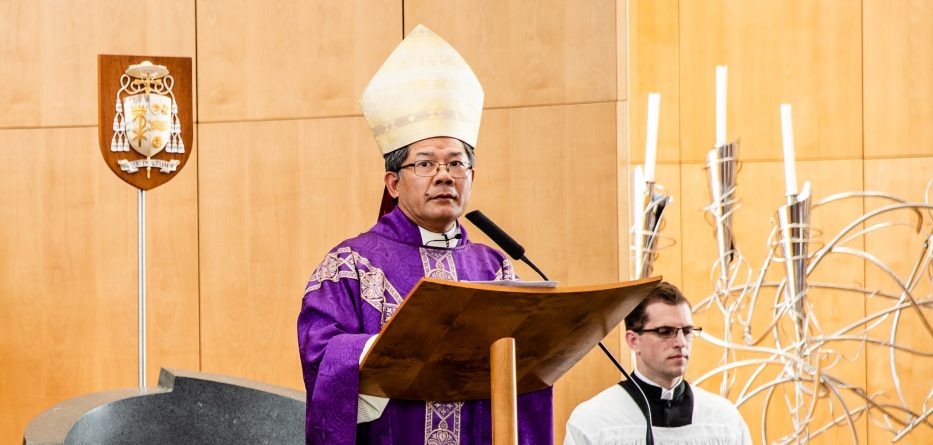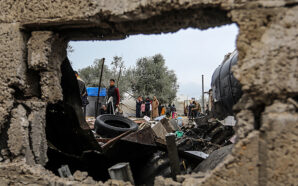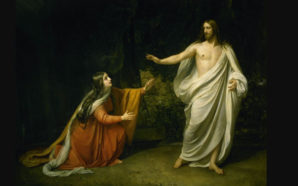Most Reverend Vincent Long Van Nguyen OFM Conv DD STL, Bishop of Parramatta
Homily for the First Sunday of Lent Year C 2019 with the Rite of Election at St Patrick’s Cathedral, Parramatta
Readings: Dt 26:4-10; Rom 10:8-13; Luke 4:1-13
10 March 2019
Grounding our discipleship for mission
Dear brothers and sisters,
As we come together this afternoon, we might as well feel like the two disciples of Jesus on their way to Emmaus.
The events of the past two weeks have left many of us Catholics deeply troubled and even traumatised. The public scrutiny of the Catholic Church by the Royal Commission into Institutional Response to Child Sexual Abuse was relentless and devastating enough.
But nothing has prepared us for this dramatic and unprecedented turn of events. We are left in shock. Many of us are hanging on by our fingernails. There is a real sense that the Catholic Church in this country is in uncharted territory.
The doomsayers would say that this might be the final nail in the coffin. They would say that the Church is dying. I happen to think that they are right – but only half right. For there is the other hidden side of the equation.
Yes, the Church is hopelessly riddled with crisis. It is dying; but it needs to die a certain death, anyway. It needs to die to whatever is an obstacle, a shackle or a stumbling block to its mission so that it can rise to shine the Gospel of hope for humanity.
In fact, the crisis that we are facing may act as a catalyst for a more urgent and intense enactment of the paschal rhythm. It can be an opportunity for the Church to die, to undo many of its ways in order to be able to embrace afresh the radical vision of the humble, inclusive, vulnerable and powerless servant Jesus.
St Paul reminds us of this paradox of living by dying: “We always carry around the death of Jesus so that the life of Jesus is also shown.” He knew personally what it meant for him to die to his previously held certitudes, privileges and entitlements in order to live with the uncertainty and vulnerablity of the Christian faith.
The Lenten season serves to remind us of the rhythm of dying and rising. It challenges us to embark on the journey of conversion to the heart of the Gospel message. As we reflect on both the experience of God’s people in the desert and that of Jesus, we are encouraged to walk the long and hard road of humility, vulnerable trust and relational faithfulness.
The Word of God today helps us to come to terms with our present predicament and focus our attention on what truly matters. It speaks of the call to be a model nation and to live by the core values of our faith, which are radically different.
In the first reading, the Israelites are given instructions regarding their life of faith in Palestine. After the painful but liberating journey out of Egypt, Moses reminded them that they must be true to the covenant. It is the Lord who delivered them from slavery and oppression so that they could live in “the land flowing with milk and honey”. The offerings they bring to the temple are the signs of their gratitude and commitment: They are to form a new society under God’s rule, one which would be marked by its characteristic embrace of the most vulnerable.
The Gospel shows us how grounded Jesus is in his relationship with God his Abba. First, when he is tempted to turn the stone into bread, he responds by way of accepting his vulnerability. It’s in our human nature to want to be in control and to have everything at our disposal. Jesus shows us an alternative. By recognising God as the true bread, he calls us to reorder our relationships so that they are aligned to the Creator’s intention, which is the abundance of life for all.
The second temptation is to be the superhero. It’s the cult of popularity, which is rampant in our success-driven society. Jesus does not buy into this illusion. He does not throw himself down from the parapet of the temple or later, the cross. He shows us the way of enduring love. He is the anti-hero who rode on the back of the donkey and immersed himself totally in the coalface realities of pain, suffering and social isolation.
Finally, Jesus is tempted to have power and glory. This is a perennial temptation that time and again Christians individually and collectively have succumbed to. In fact, the history of imperial Christendom shows that power, dominance, privilege, control and clericalism have characterised our attitudes and practices more than service, self-sacrifice, vulnerability and powerlessness of the humble Servant.
Our call today is to be the Kingdom builders whose priority is not to dominate and eliminate others but to mend and to heal communities and relationships.
Brothers and sisters,
As a Church, we are called to die and rise again. We are being led from a position of power and strength to that of powerlessness and vulnerability; from a position of wealth and influence to that of being poor and humble; from a position of greatness to being a minority.
It can be daunting and disconcerting. But the example of Jesus inspires us to be ever faithful to God’s purpose.
Let us pray for these candidates and their families as they respond to God’s call to being disciples of Jesus. Let us pray for each and everyone of us as we endeavour to live the call of the Christian discipleship in an age of mistrust and scepticism. May the God who accompanies His people lead us out of darkness into the new dawn of hope. May we learn the art of living in God’s presence: our identity grounded, our commitment deepened, and our mission nurtured for greater service of the Kingdom.








